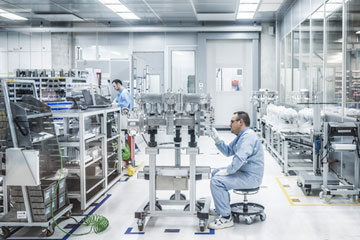
Laser manufacturer Trumpf relies on the euro zone for nearly half its sales.
(3 of 5)
The reform agenda was accomplished because of Germany's successful public-private partnerships. Governments, companies and unions cut deals together, a process aided by the fact that they are all represented on corporate boards, and Germany's family-owned Mittelstand firms were able to take the long view rather than be beholden to the short-term-profit pressures of the typical Western public multinational. "Ten years ago, Germany was the sick man of Europe," says Stefan Wolf, CEO of ElringKlinger, a 130-year-old Swabian export firm that sold $1.5 billion in auto parts last year. "Now people look at us and see we're doing a pretty good job," he adds, echoing a view common among his Mittelstand peers. "The southern European economies," he says, likewise "have to reform."
When you spend time in Stuttgart and hear the stories of how the Mittelstand firms have weathered the past several years of debt crises and recession, it's easy to understand why Germany's feelings about its role as both savior and scapegoat of Europe are tinged with moral outrage. The Mittelstand firms embody something close to an ideal of corporate responsibility. Consider how Trumpf made it through the crisis of 2008, when revenue suddenly dropped by more than 40%. Rather than lay off workers, as any American firm would have done, Leibinger-Kammüller used $100 million of her family's money to keep the business afloat, while working with labor to establish flexible schedules that would make it possible to weather the crisis without a single layoff. "Our employees helped us bear the brunt of things by accepting wage reductions," she says. "We wanted to avoid layoffs at any price, first because we feel responsible for our long-term employees, but secondly because we knew that after the recession, things would improve and we'd need our workers again."
They did. By 2009 the company was growing again. Throughout the crisis and recovery, Trumpf continued investing 8% to 10% of its annual turnover into research and development. (The average global multinational invests 2% to 3%.) "None of this needs be a blueprint for the rest of Europe," says the CEO. "But the fact remains that it does form the basis of success for many German companies."
Playing to Type
The "let Germany be Germany" idea is ubiquitous in Stuttgart. "You can't change national models overnight," says Schmid, the Baden-Württemberg finance minister. "We have a model, which is export-led growth, that works well for us." He and others understand that German wages, which have been unnaturally low relative to productivity for some time, need to rise; in January, the megaunion IG Metall fought for and won a 5% wage increase. But it's a slow process. "Don't bet on Germany adopting the Anglo-American model," says Daimler's Müller. Germany, after all, is one of the few rich countries that have been able to keep a strong manufacturing sector, which creates the sort of middle-income jobs that foster a thriving middle class.
